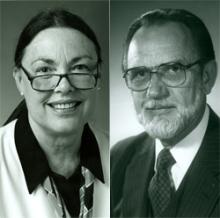Two new endowments under establishment at the School of Music will pay homage to Professors Emeriti James C. Carlsen and Barbara Reeder Lundquist and their pioneering contributions to the fields of Systematic Musicology and Music Education.
The endowments will enable the School to provide music students opportunities for research and scholarship while honoring the legacy of two esteemed educators who have made a profound impact in their fields of research and in the lives of their students.
When fully funded, the James C. Carlsen Scholar in Music Cognition and Learning will help to bring multiple scholars in the field of Music Cognition and Learning to the School of Music each year to share the latest research on music cognition and explore how such work can inform contemporary approaches to teaching and learning music. The endowment also will provide support for Music Education students and faculty to further advance research in this field of study.
The Barbara Lundquist Fund for Excellence in Music, Education and Culture will provide critical support to the Music Education program, providing enhanced opportunities through scholarship and program support for students training to disseminate knowledge through a broad spectrum of musical traditions. Funds from this endowment will also help bring in visiting scholars in fields of music, education and culture, and ethnomusicology.
The School of Music has set a goal of raising $25,000 to establish each endowment. Dollar-for-dollar matching funds are now available to alumni or friends who would like to help officially launch the James C. Carlsen Scholar in Music Cognition and Learning and the Barbara Lundquist Fund for Excellence in Music, Education and Culture. For more information, contact Cristi Benefield at (206) 543-1221 or cristi@uw.edu. Thank you!
James Caldwell Carlsen
Professor Emeritus James Caldwell Carlsen is recognized worldwide for his leadership in psychomusicology, research methodology, and music education. Founder of the UW Systematic Musicology graduate program (established in 1967 and active through the mid-1990s), he was notable on campus and throughout the world for the substance, insight, clarity, and humor of his lectures on psychomusicology and research.
In addition to serving in an editorial capacity for several scholarly journals, such as the Journal of Research in Music Education, the Japanese Journal of Music Perception and Cognition, and Psychomusicology, Dr. Carlsen held key leadership roles in a number of research and professional organizations. His many honors include a Danforth Teacher Fellowship, two International Research Exchange awards, and a Fulbright fellowship.
“James Carlsen established the Systematic Musicology program at UW when few in the music academy had the foresight to establish a program of research and teaching that embraced the tools and philosophy of the scientific method,” says David Brian Williams, president of The College Music Society and a 1970s alumnus of the doctoral program. “For those of us who were fortunate to study under his mentorship, he helped instill in us skills and a healthy mindset founded on rigorous methods of inquiry, a clear sense of the importance of theory development, and a passion for seeking answers to a richer understanding of the music experience.”
Barbara Lundquist
Professor Emerita Barbara Reeder Lundquist taught Music Education and Systematic Musicology at the UW School of Music from 1970 to 1991, serving as chair of Music Education and professor of Sociomusicology. An internationally known author and clinician in multiethnic-multicultural music education, she has won numerous awards and served as a curriculum consultant for music education in Malawi and Mozambique for the United States Information Service and the U.S. Office of Education.
Dr. Lundquist’s research and curricular philosophy have been featured in articles in a wide range of professional publications and academic journals, and she has served in a number of top leadership positions in national academic societies and organizations. Author of numerous textbooks, she also designed curriculum projects for the Ford Foundation’s Contemporary Music Project and the U.S. Office of Education’s Manhattanville Music Curriculum Project, among others.
Alumna Carol Scott Kassner, who studied under Dr. Lundquist as a graduate student at the School of Music, calls her a “true force of nature” and credits her as the inspiration for her deep and abiding interest in world music.
“Her dynamism pulls you into learning in wonderful ways,” Dr. Kassner says. “She risked exploring West African drumming on a deep level in the mid-1960s, way before others were exploring the teaching of world music. She, more than any of my female professors, was a model of what was possible for women in higher education as teachers, leaders, and scholars.”
